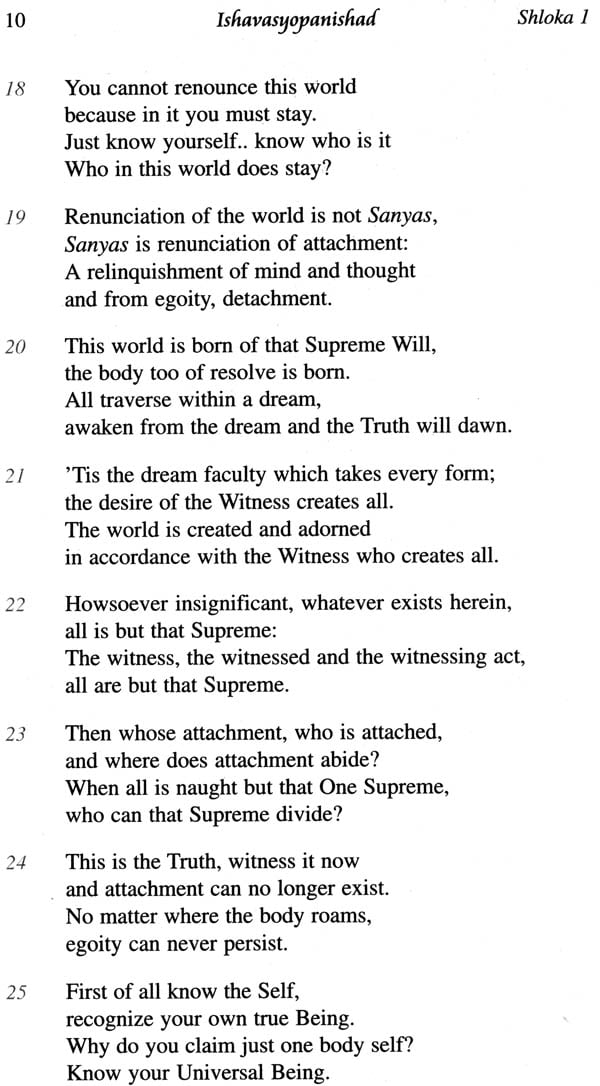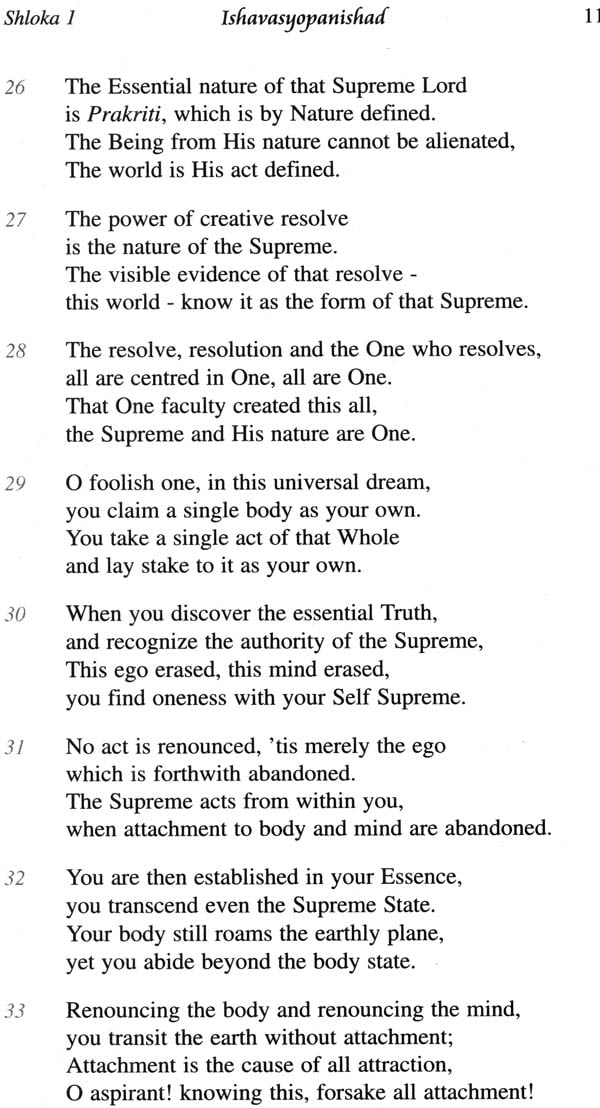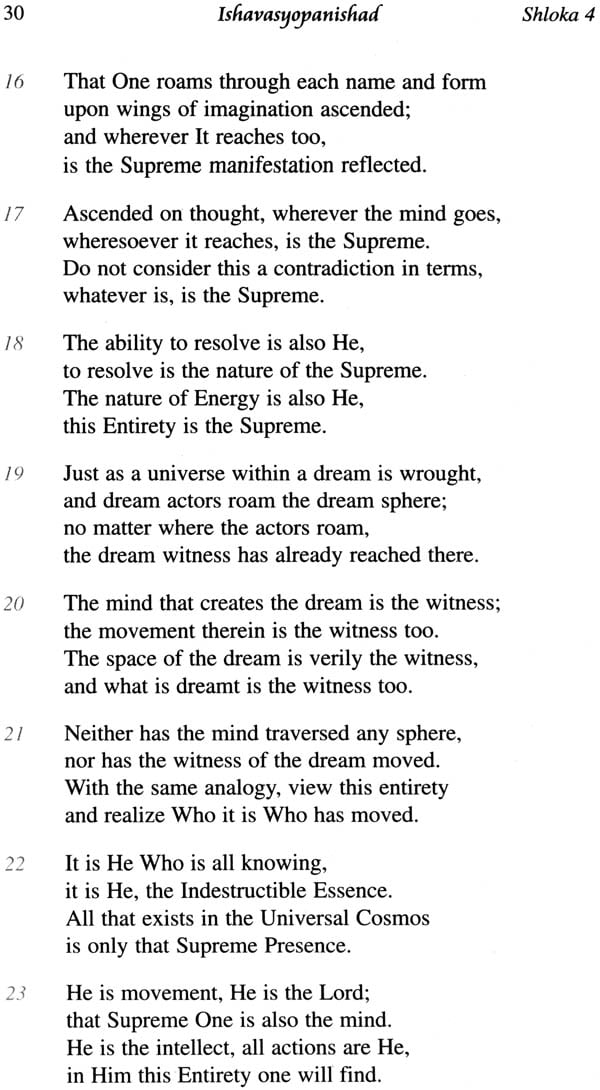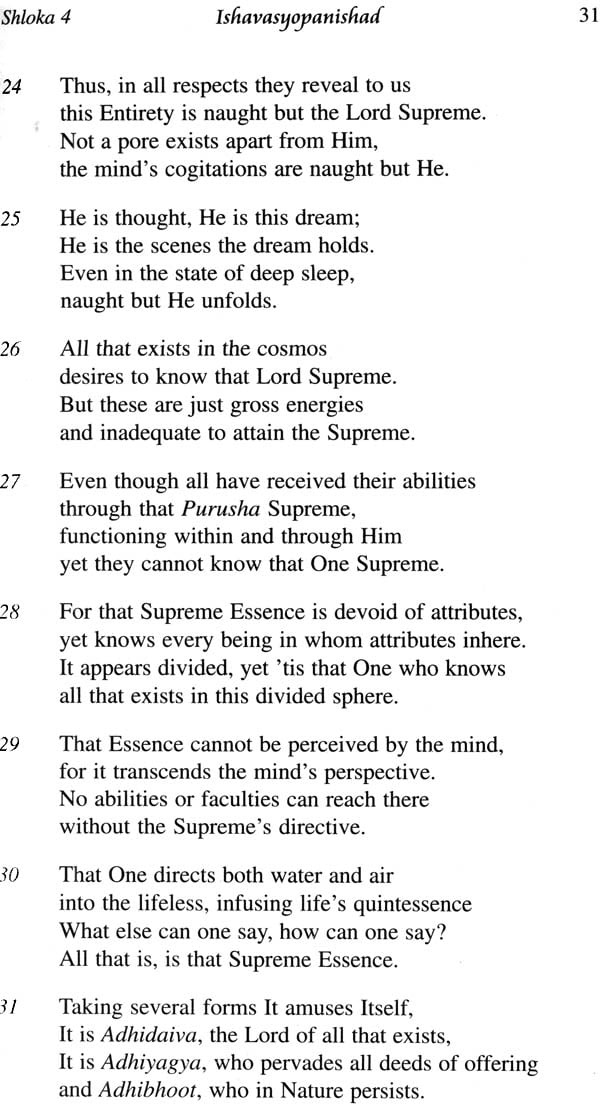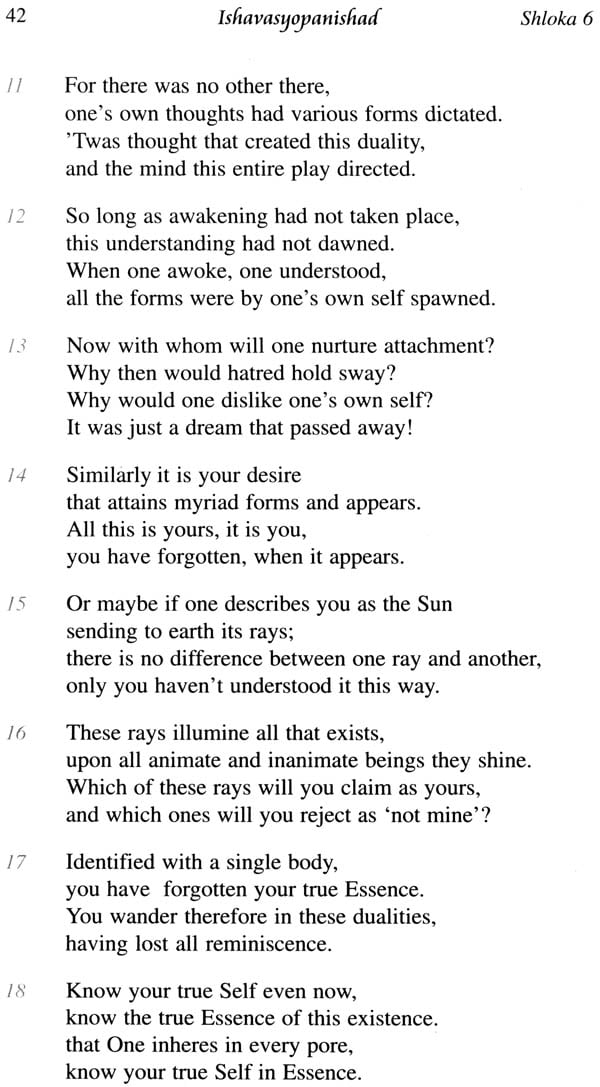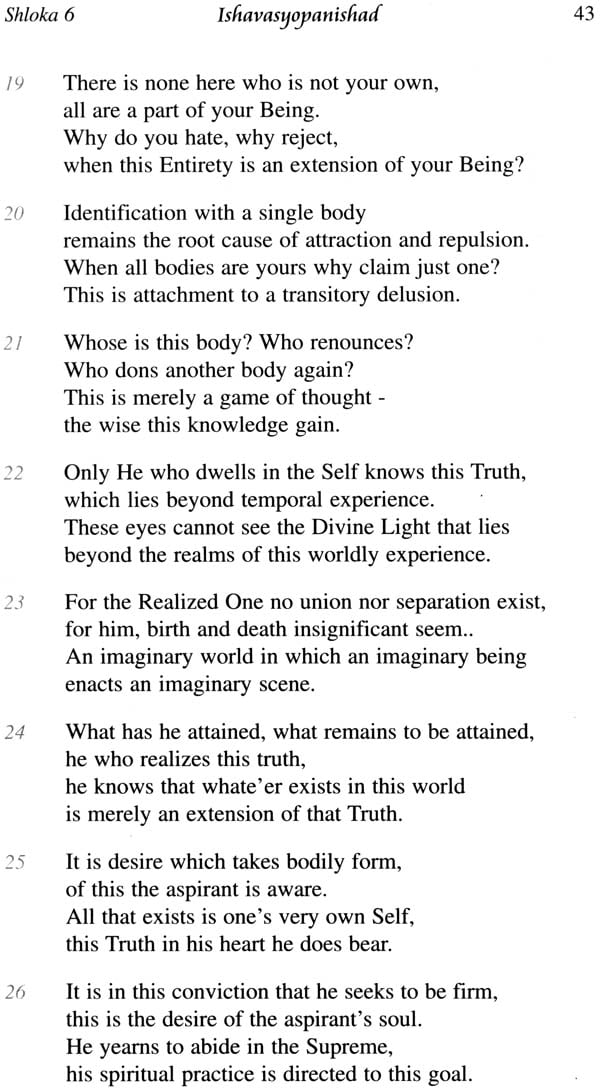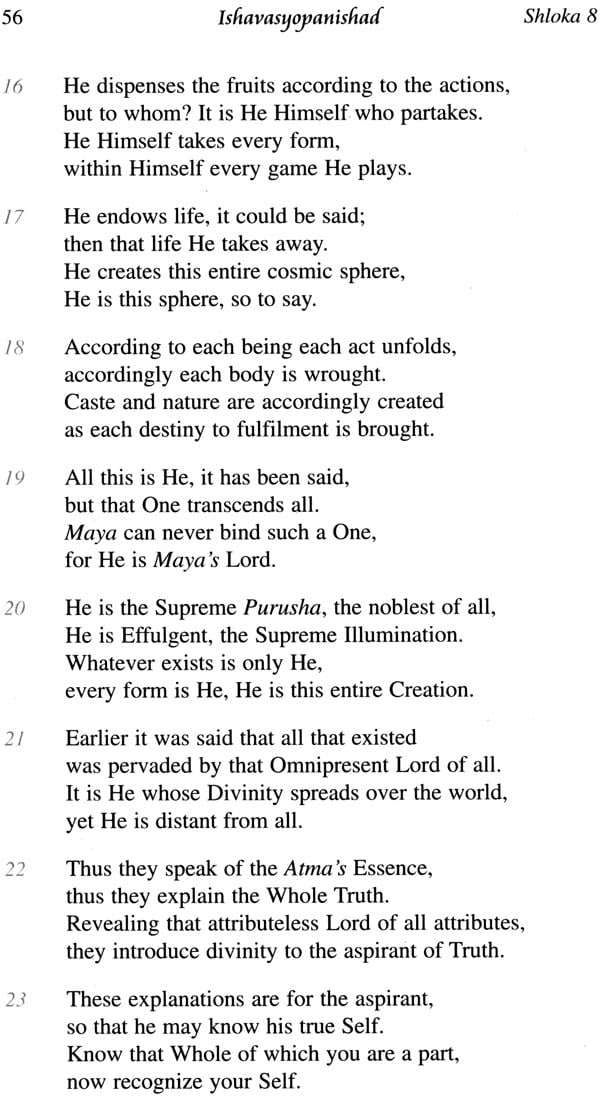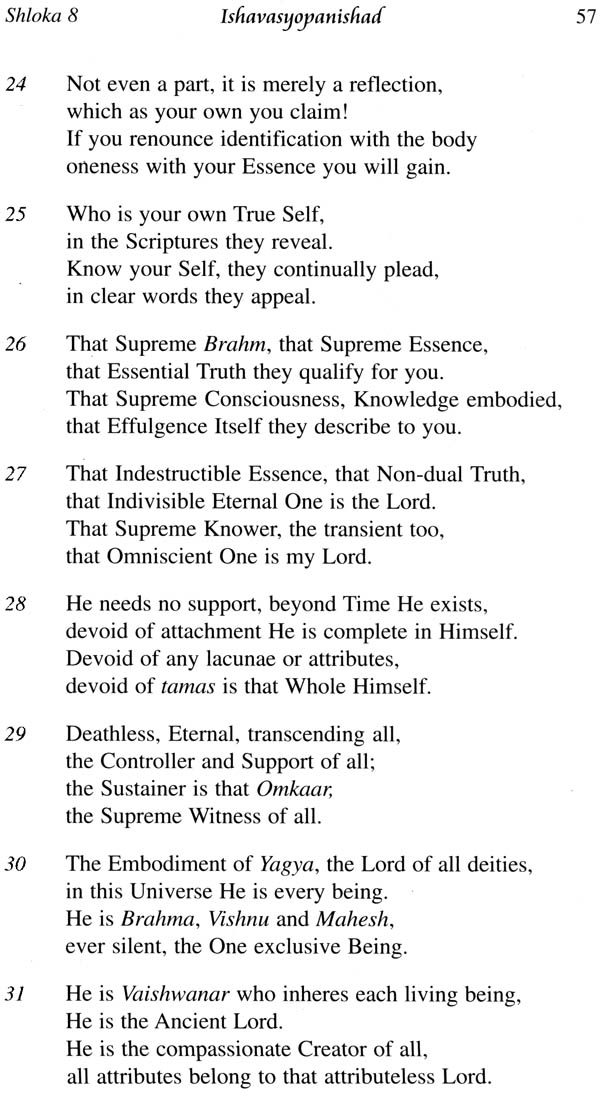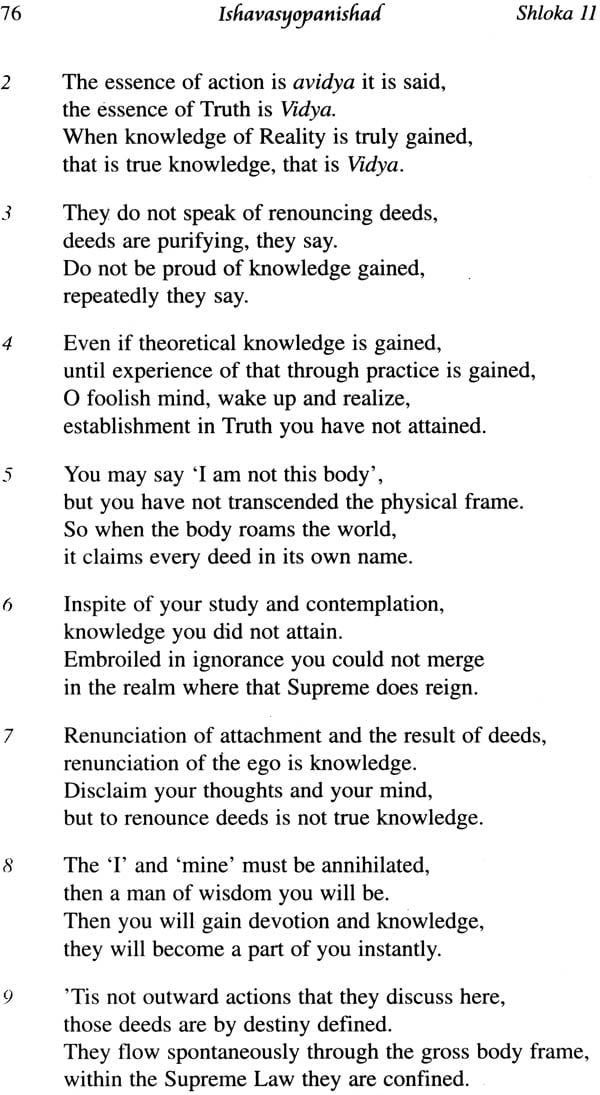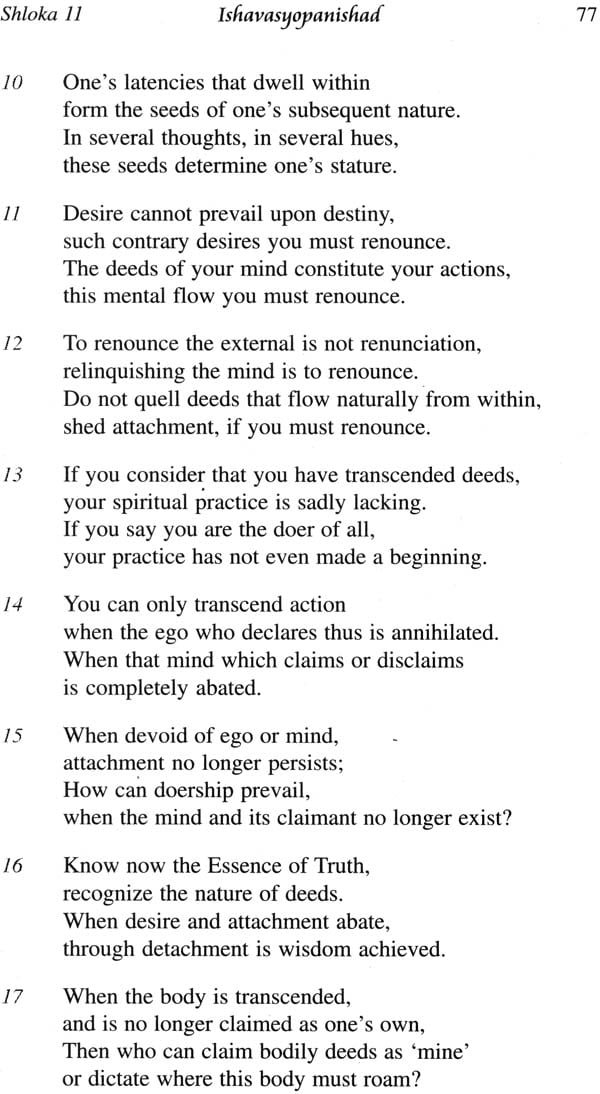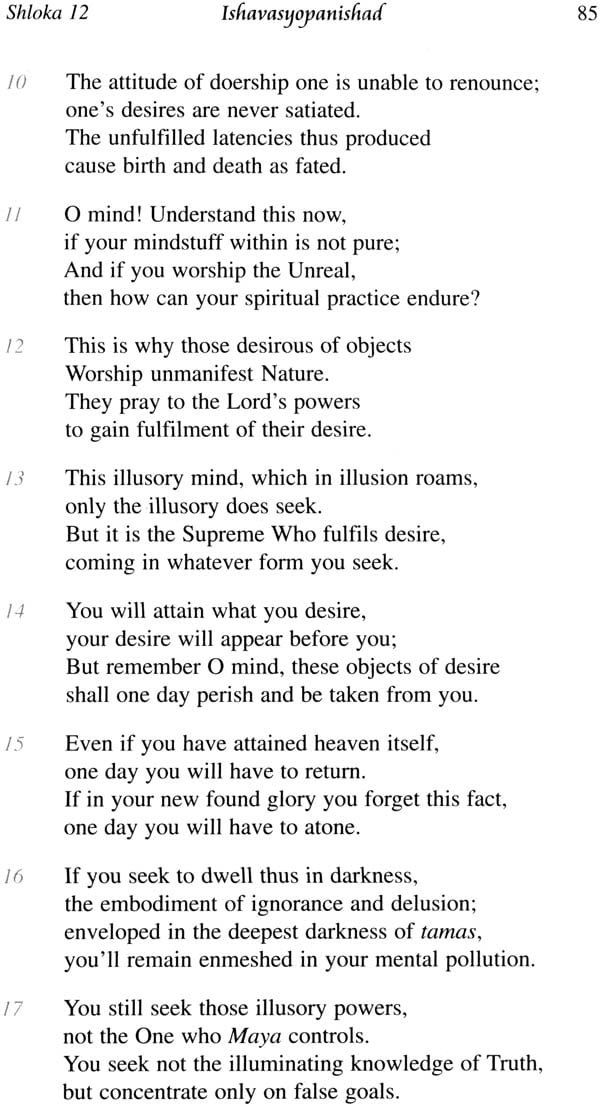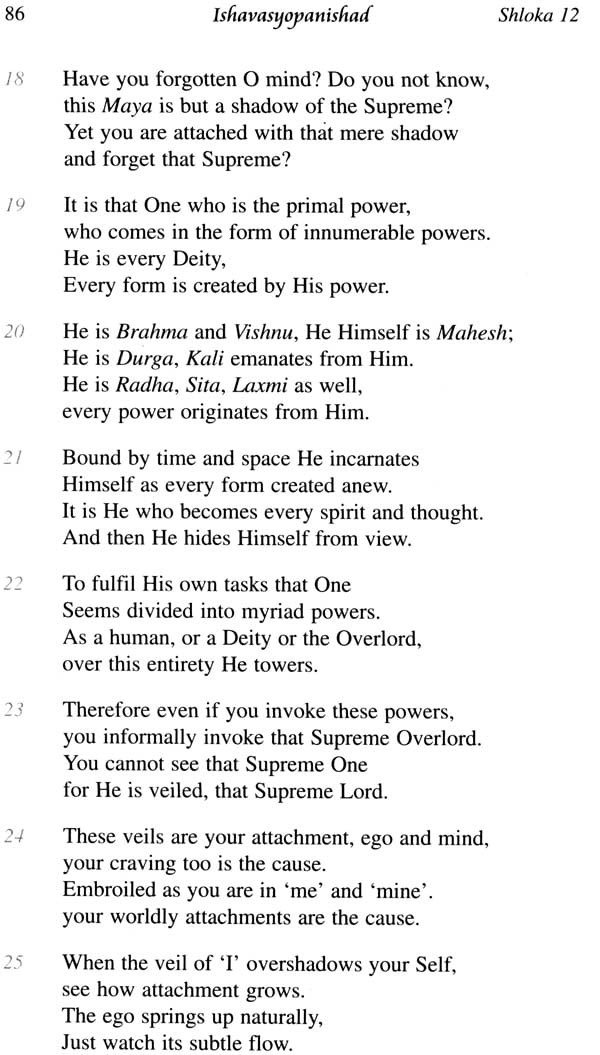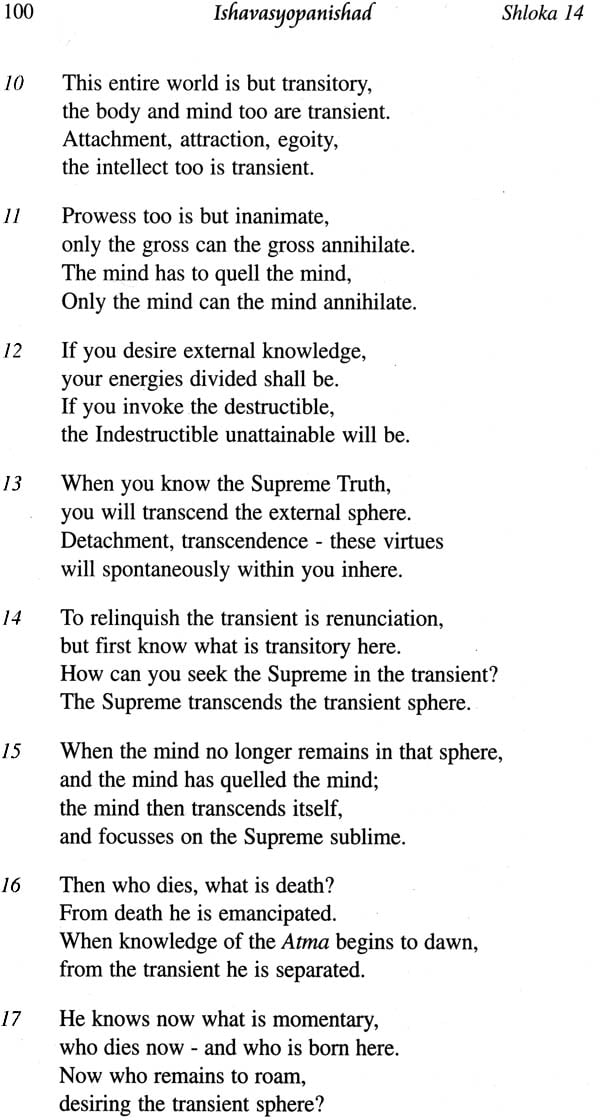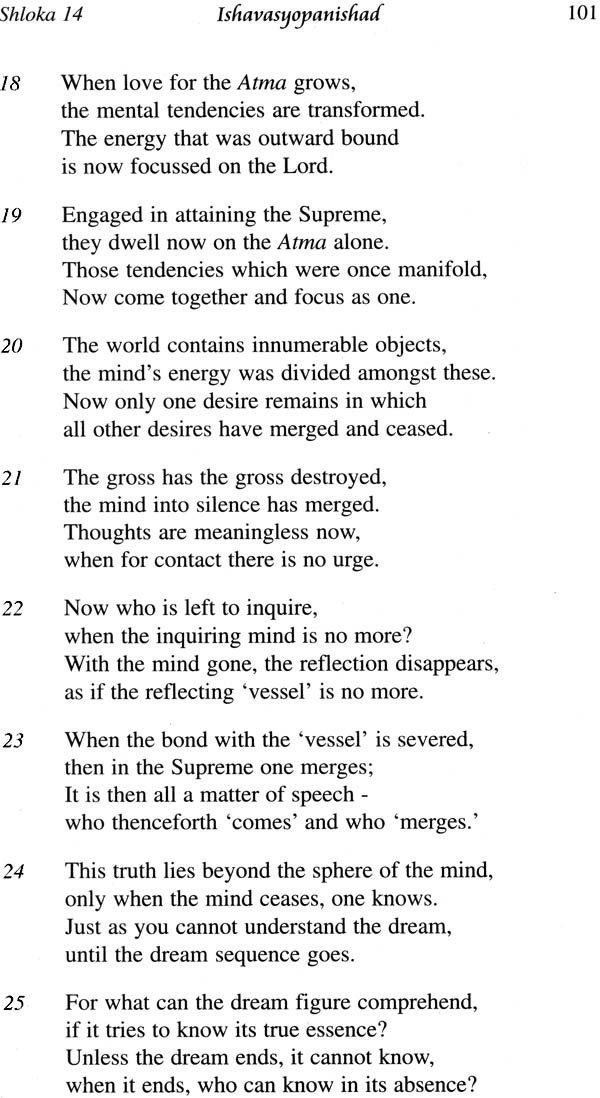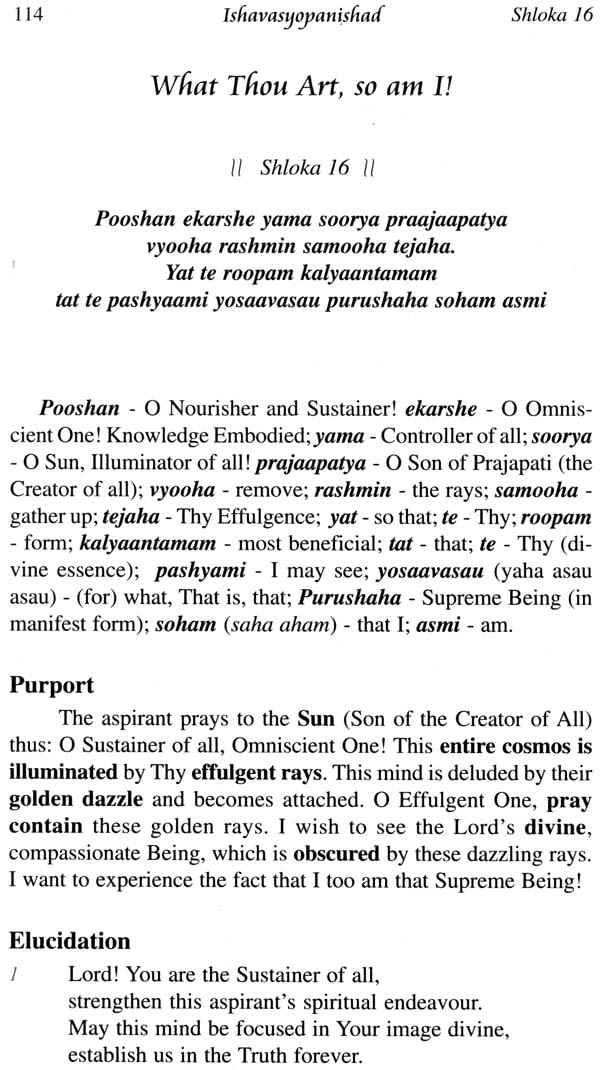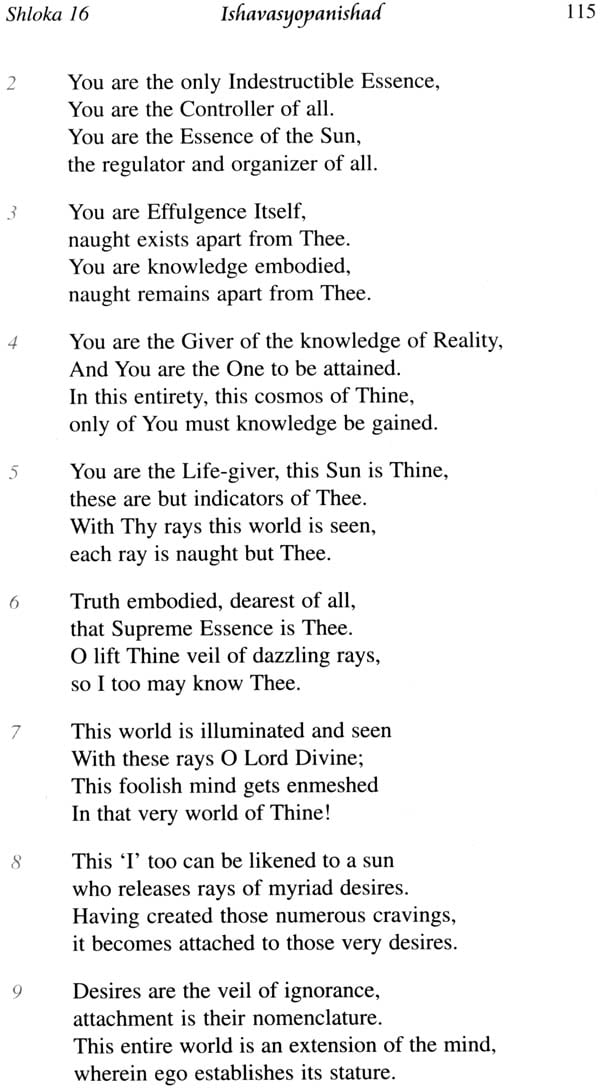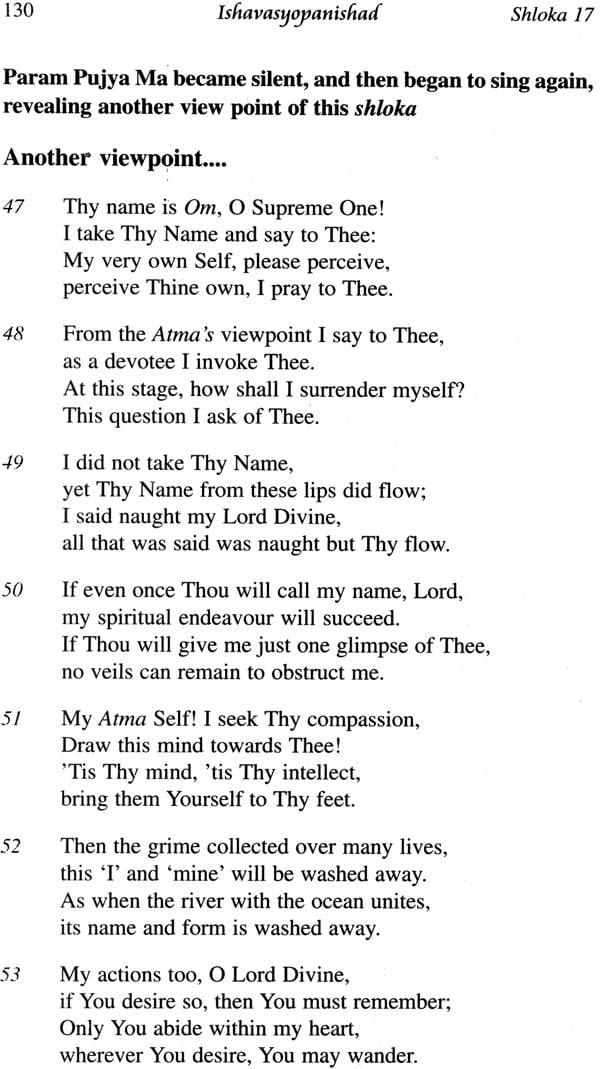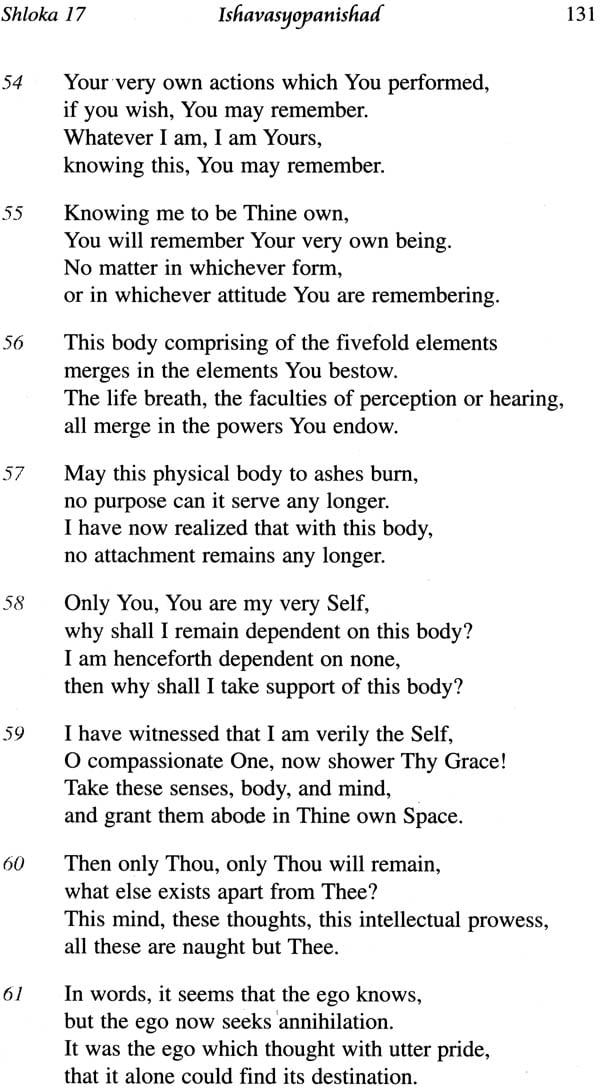
Ishavasyopanishad (From The Unreal to The Real to The Eternal)
Book Specification
| Item Code: | NAK562 |
| Publisher: | Arpana Publications |
| Language: | English |
| Edition: | 2006 |
| ISBN: | 8186338403 |
| Pages: | 148 |
| Cover: | Paperback |
| Other Details | 8.5 inch x 5.5 inch |
| Weight | 230 gm |
Book Description
This translation of the Ishavasyopanishad is based on the pristine elucidation of this Upanishad by Param Pujya Ma in Spontaneous verse. In Param Pujya Ma's elucidations of the Upanishads we find a synthesis of Gyan (Knowledge), Karma (Action) and Bhakti Devotion in every shloka. The knowledge in given and Bhakti (Devotion) in every shloka. the knowledge is given and the action that follows from it is always with an attitude of devotion. The recognition of the Truth that nothing is possible without the Grace of the Lord is prevalent right through the elucidation.
In keeping with the above attitude, Brahm has been referred to by many names and terms such as: the one, whole supreme, Self, Universal form, Essenece, Witness Infinity, Entirety, Unity, Non-dual Reality, silence, Presence, Soul, Atma Overlord, lord, God Ram Purusha Vaishvanar, Omkaar and so on every individual may understand an relate to any of these according to his own concepts. But there is no difference in their basic meaning as they all refer to the one Brahm.
For readers who would like to obtain a deeper understanding of the Scriptural terms used, it is recommended they refer to the English publication of the Srimad Bhagavad Gita and the Kathoponishad of Arpana publications.
Long vowel sounds in Sanskrit are indicated by double vowels in English, but other differences in the sounds of the Sanskrit words are not reflected in the English spellings. This is to make it easy for the reader of English to get some idea of the pronunciation of the Sanskrit without going into diacritic marks etc. Whilst explaining the meanings of the Sanskrit words, the reader may notice that they are sometimes repeated in bracket- this is to give the full form of the word, as opposed to the modi-fied form which appears when that word is a part of the shloka and its spelling is changed due to sandhi (Joining of Separate words) etc.
Each stanza of every shloka is numbered in accordance with the original flow, to make it easy for the serious student to make a reference to the original Hindi text. The meanings of the words of the Sanskrit shlokas have been kept as simple as possible so that can be easily grasped by the modern day reader.
It has been my endeavour to reflect the simplicity and clarity of the original Hindi, along with its natural poetic flow, in the English rendering, to whatever Hindi, along with its natural poetic flow, in the English rendering, to whatever extent possible. However, I am deeply conscious that despite all my efforts, the pristine beauty of the original Hindi elucidation has suffered in expression and the limitations of a translation remain evident. However, if this book serves to convey the intensely the intensely devotional approach and the practical import of the Ishavasyopanishad, as explained by Param Pujya Ma in this elucidation, it has fulfilled its task.
I am extremely grateful to kusum Bhojwani and Kunda Kelkar, for their most important contribution in bringing this translation as close as possible to its original Hindi text. I am also indebted to Abhik Sachdeva and Loic Fave for their indefatigable efforts for developing the cover design and their aid in production of this book.
| Peace Invocation | ||
| Obeisance to the Encompassing Brahm | 1 | |
| Attachment and Detachment | ||
| 1 | Detached enjoyment of the Cosmos | 7 |
| 2 | The Practice of Detachment | 15 |
| 3 | Results of Attachment | 21 |
| Brahm – Supreme Lord – Self | ||
| 4 | Brahm – The Primal Cause of All | 27 |
| 5 | The Omnipresent Brahm | 34 |
| 6 | Rewards of recognising the Indivisible Brahm | 40 |
| 7 | Rewards of the Practice of Unity | 46 |
| 8 | The Self incarnating Lord | 53 |
| Vidya and Avidya Spiritual and Worldly Knowledge | ||
| 9 | Avidya and Vidya - Misue of Both | 60 |
| 10 | Vidya and Avidya – Use and Misuse | 68 |
| 11 | Rewards of both Vidya and Avidya | 75 |
| 12 | Asambhoti and sambhooti – Misuse of the Knowledge of Both | 83 |
| 13 | Sambhooti and Asambhooti- Use and Misuse of Their Knowledge | 91 |
| 14 | Rewards from the Knowledge of both Sambhooti and Asmbhooti | 99 |
| Prayer | ||
| 15 | Lift Thine Viel! | 108 |
| 16 | What Thou Art, so am I! | 115 |
| 17 | Remember your Deeds! | 124 |
| 18 | May all Deeds Burn in the fire of Knowledge! | 134 |
